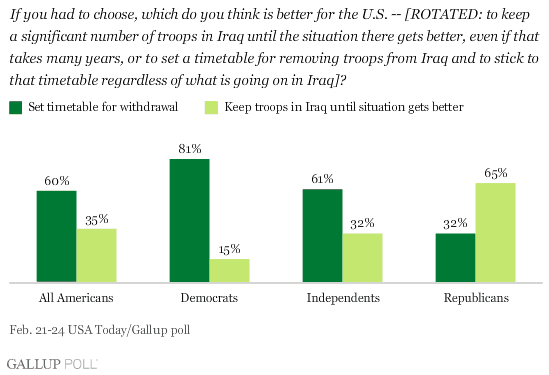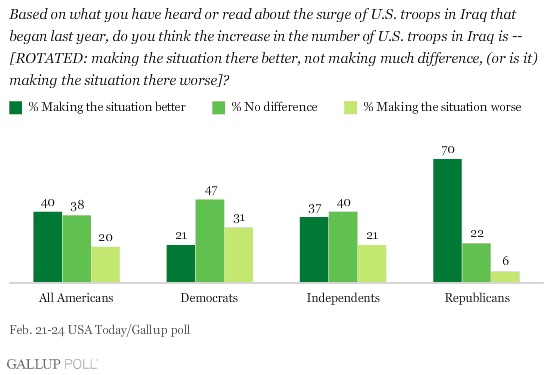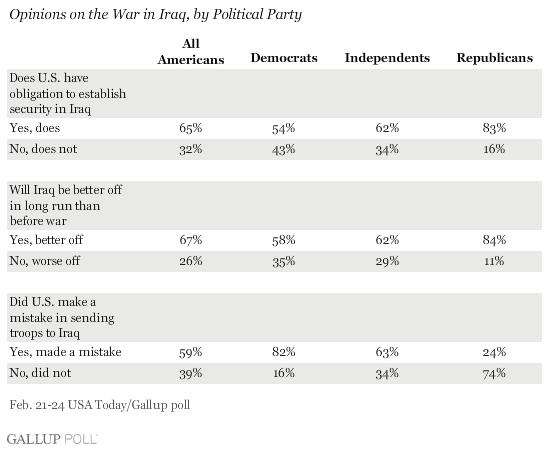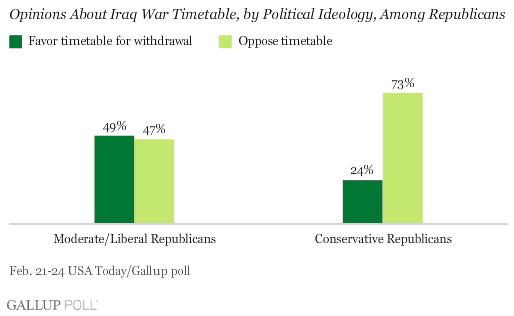PRINCETON, NJ -- Republicans reject the idea of a timetable for withdrawing U.S. troops from Iraq, by a better than 2-to-1 margin, 65% to 32%. Democrats show an even greater margin in favor of a timetable, with 81% in favor and 15% opposed.

Political divisions on the war have long been evident in Gallup polling data on Iraq, and those divisions continue today. Three national elections since the war began -- the 2004 and 2008 presidential elections and the 2006 midterm elections -- have shone a bright spotlight on those differences. In general, Republicans tend to support the war and oppose plans to end it before the situation is stabilized, while Democrats oppose it and seek an end to U.S. involvement.
This political divide on Iraq will be in clear public view on Tuesday when Gen. David Petraeus, commander of U.S. forces in Iraq, testifies before Congress. Among his questioners will be the three leading presidential candidates, Republican Sen. John McCain and Democratic Sens. Hillary Clinton and Barack Obama. The candidates' views on the war are in line with the rank-and-file of their parties.
In addition to the desirability of a troop withdrawal timetable, partisans have differing views on how successful the surge of U.S. troops in Iraq has been. Most Republicans, 70%, believe it is making the situation in Iraq better. In contrast, only 21% of Democrats say it is improving the situation, with nearly half (47%) saying it is not making much difference, and 31% saying the surge is making matters worse. Independents are about evenly divided in their views as to whether the surge is making the situation better (37%) or not making much difference (40%).

Views of a withdrawal timetable and the progress of the surge are just two of a number of examples of wide political gaps in opinions about the war. The accompanying table shows some of the other polarized views on Iraq by party. The largest difference is evident in basic support for the war (whether the United States made a mistake in sending troops); there is a smaller gap on whether the United States has an obligation to establish security in Iraq.

As a whole, Democrats are opposed to the war, and their attitudes differ little by their political ideology. But Republicans of different ideological stripes differ on several Iraq issue dimensions. For example, liberal or moderate Republicans are divided as to whether the United States should set a timetable for withdrawing from Iraq, while conservative Republicans overwhelmingly oppose a timetable.

Moderate and liberal Republicans (40%) are also twice as likely as conservative Republicans (19%) to say the United States made a mistake in getting involved in Iraq, and are somewhat less optimistic that the surge is making things better (52%) than are conservative Republicans (78%).
On the Iraq issue, McCain is closely aligned with the conservative wing of the party. That is notable given that conservative leaders have criticized McCain's positions on a number of issues, including immigration, taxes, and campaign finance.
Implications
The 2008 presidential election will present voters with a clear choice on Iraq, with Republicans putting forth one of the Senate's fiercest supporters of the war and Democrats choosing one of two leading Senate opponents, including Obama, who has made his opposition to the war from the beginning a major focus of his campaign. If McCain is elected, U.S. policy on Iraq will likely continue as it has under the Bush administration, with slower troop drawdowns tied to progress in establishing security in Iraq. If Obama or Clinton is elected, finding a quick end to the war will likely be the new president's top priority.
In general, the public tends to side with the Democrats from the standpoint of favoring a timetable, but relatively few advocate a quick withdrawal. And most seem sympathetic to the Republican argument about the United States needing to establish a certain level of security before leaving Iraq.
Survey Methods
Results are based on telephone interviews with 2,021 national adults, aged 18 and older, conducted Feb. 21-24, 2008. For results based on the total sample of national adults, one can say with 95% confidence that the maximum margin of sampling error is ±2 percentage points.
For results based on the sample of 692 Democrats, the maximum margin of sampling error is ±4 percentage points.
For results based on the sample of 695 independents, the maximum margin of sampling error is ±4 percentage points.
For results based on the sample of 627 Republicans, the maximum margin of sampling error is ±4 percentage points.
Interviews are conducted with respondents on land-line telephones (for respondents with a land-line telephone) and cellular phones (for respondents who are cell-phone only).
In addition to sampling error, question wording and practical difficulties in conducting surveys can introduce error or bias into the findings of public opinion polls.
